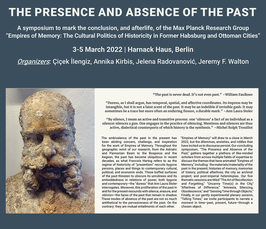"The Presence and Absence of the Past"
Workshops, conferences 2022
- Start: Mar 3, 2022 02:00 PM (Local Time Germany)
- End: Mar 5, 2022 07:00 PM
- Location: Harnack Haus, Berlin & Zoom

For more details please contact recke(at)mmg.mpg.de.
Organizers:
Çiçek İlengiz, Annika Kirbis, Jelena Radovanović, Jeremy F. Walton
The ambivalence of the past in the present has been abiding concern, challenge, and inspiration for the work of Empires of Memory. Throughout the geographic remit of our research, from the Adriatic and Pannonian Basin to the Bosporus and the Aegean, the past has become ubiquitous in recent decades, as what Francois Hartog refers to as the regime of historicity of “presentism” recruits bygone persons, places and things to contemporary cultural, political, and economic ends. These buffed surfaces of the past threaten to obscure its unruliness and its embeddedness in relations of power, both bygone and contemporary—the “duress” that Ann Laura Stoler interrogates. Moreover, this proliferation of the past in and for the present resounds with silence, erasure, and oblivion—the faces of the past that remain in shadow. These modes of absence of the past are not so much antithetical to the pervasiveness of the past. On the contrary: they are mutual entailments of each other.
“Empires of Memory” will draw to a close in March 2022, but the dilemmas, anxieties, and riddles that have incited us to discourse persist. Our concluding symposium, “The Presence and Absence of the Past,” gathers together a plethora of like-minded scholars from across multiple fields of expertise to discuss the themes that have animated “Empires of Memory,” including: the materials/materiality of the past in the present; histories of memory, memories of history; political afterlives; the city as archival project; and post-imperial heterotopias. Our five thematic sessions are titled “The Art of Recollection and Forgetting,” “Uncanny Time(s) in the City,” “Afterlives of Difference,” “Amnesia, Silencing, Obsolescence,” and “Sensing Time through Objects.” Finally, in our gently experimental plenary session, “Telling Times,” we invite participants to narrate a moment in time–past, present, future–through a chosen object.